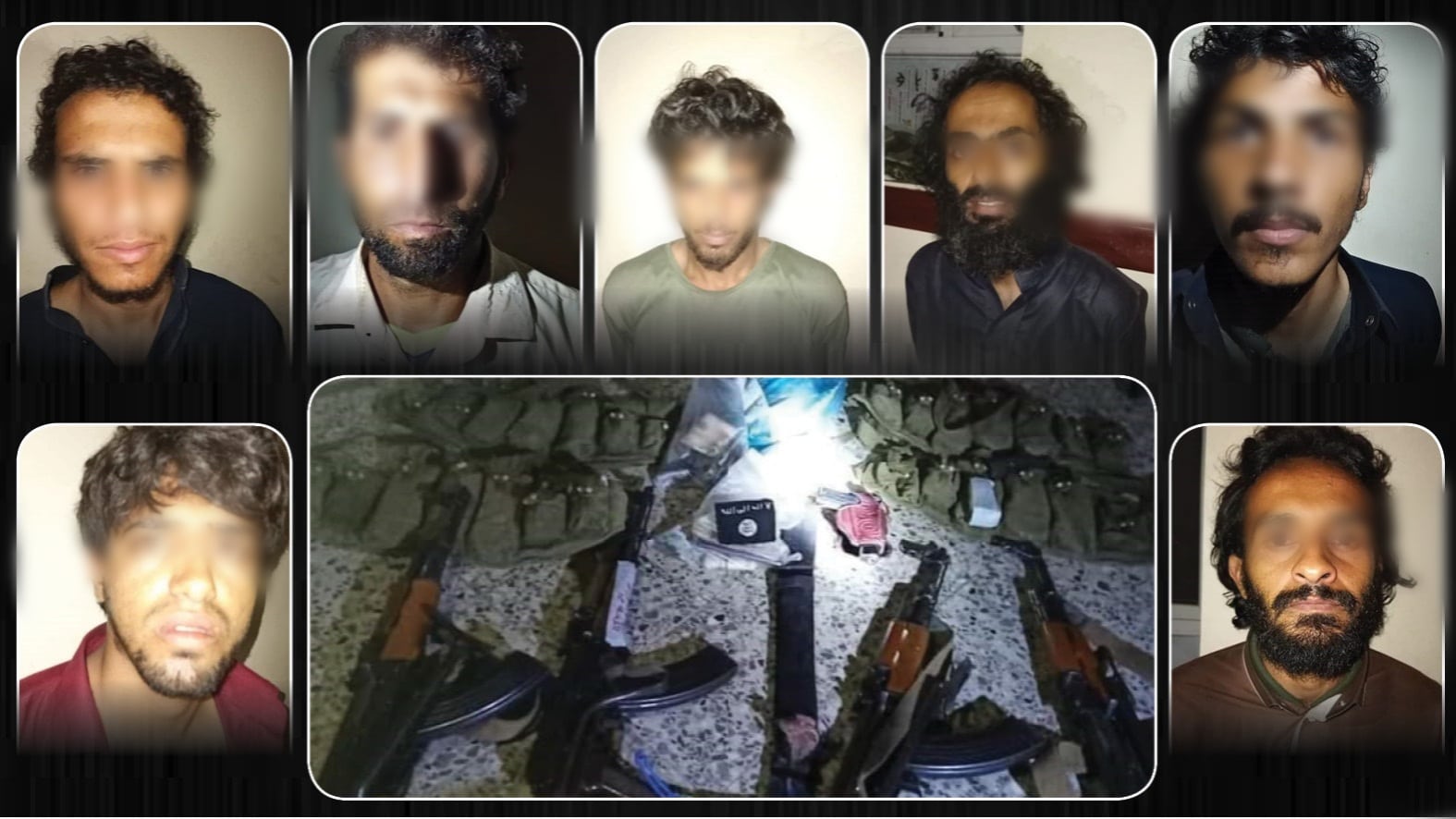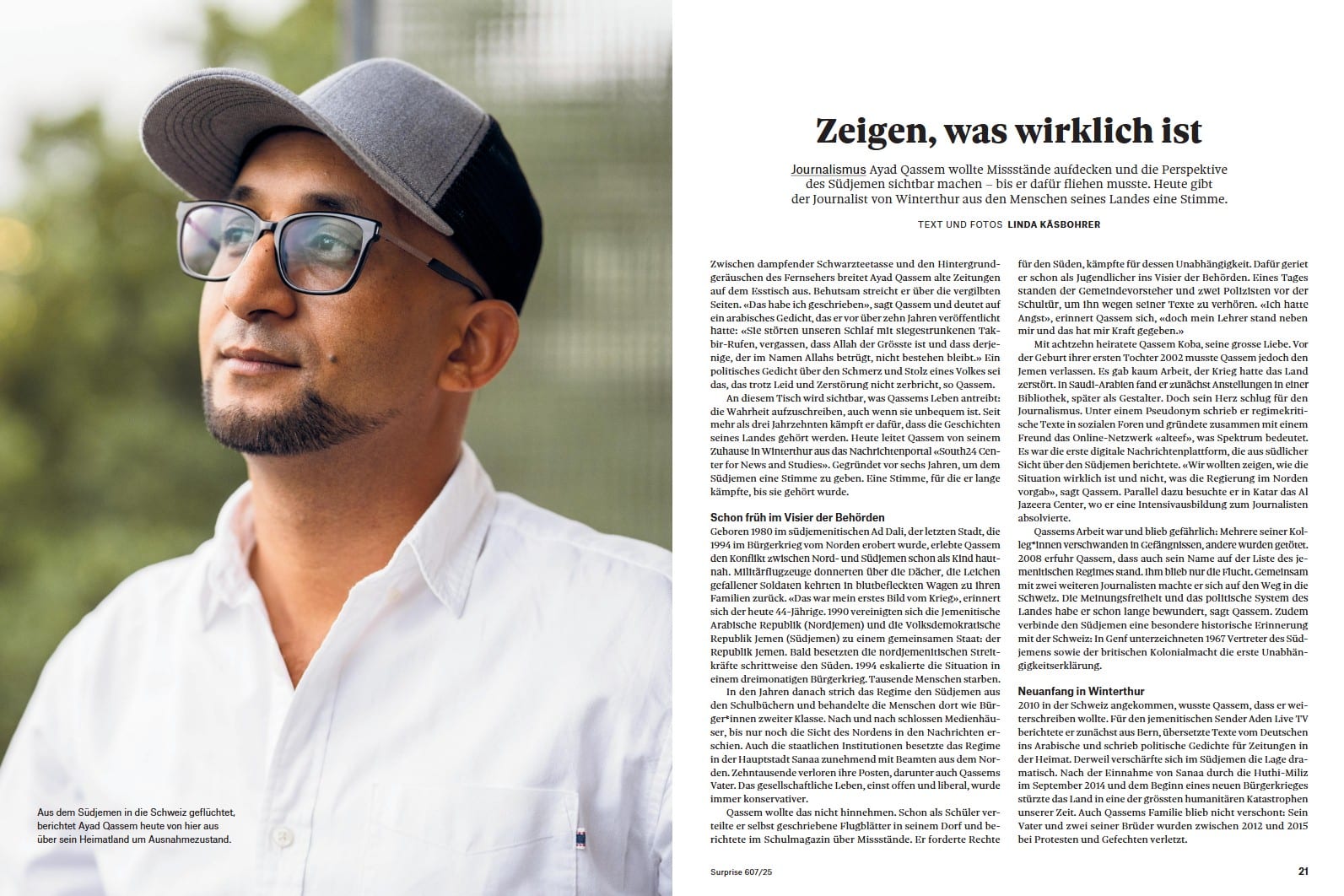
The ISIS cell arrested by the Southern forces in Yafaa, Lahj governorate, May 25, 2023 (South24 compilation - official)
آخر تحديث في: 03-07-2023 الساعة 5 صباحاً بتوقيت عدن
Some parties may want to distract the efforts of the Southern forces that fight AQAP in Abyan and Shabwa by creating new terrorism hotbeds in other governorates.
Ibrahim Ali* (South24)
More than two years after the cessation of ISIS activities in Yemen, units affiliated with the Security Belt Forces in Lahj governorate arrested an ISIS cell on May 25 in Labous district that borders Al-Bayda governorate.
The cell consists of 7 members, 4 of whom are Saudi nationals, and came from Al-Bayda which is fully controlled by the Houthis. It had weapons, ammunition, bombs, an explosive belt, and pro-ISIS slogans. Some members of the group previously existed in Sanaa some time ago, especially the senior Saudi member known as "Abu Shamekh Al-Qahtani" who defected from the AQAP in favor of ISIS some years ago.
Not an innocent synchronization
The security operation by Southern forces came concurrently with unprecedented Houthi interest in the situation within the Southern governorates as well as political and military moves on the ground by Saudi Arabia there. It also came simultaneously with the escalation of the AQAP’s activities in Abyan and Shabwa as the group carried out more than 31 attacks over the first 6 months of this year against units and formations belonging to the Southern forces who are affiliated with the Southern Transitional Council (STC). Some of these AQAP attacks were carried out by using drones for the first time. The ISIS incident in Yafa is closely related to these matters and not separated from them.
Recreating ISIS
The infiltration attempt by ISIS elements towards South Yemen at that time indicates that there are efforts to recreate ISIS to disturb the political and security situation in the strategic area located in the Arabian Sea and the Bab Al-Mandab Strait.
This happens although this newly-formed branch didn’t ever have bastions or popular incubators in these governorates. Even when some ISIS elements left Aden for Yafa in 2016, the group failed to stay there for days. Thus, it left Yafa immediately to Wald Rabi district in Al-Bayda governorate in central Yemen, where the group stayed till 2020 without attacking the Houthis or being attacked by them before this date. This is contrary to AQAP which was able to create strongholds in governorates such as Abyan and Shabwa during the reign of former President Ali Abdullah Saleh.
Recreating the ISIS card comes concurrently with strategic gains that were and still being made by the Southern forces against AQAP elements in Abyan and Shabwa. It can be said that there is keenness on consolidating the idea of the presence of terrorism in South Yemen. The ISIS return is completely in harmony with concerns by political parties about the ability of Southern forces to entirely eliminate AQAP in these areas.
AQAP has probably been able to escalate its attacks recently as shown in recent graphic statistics by “South24 Center”. However, the state of AQAP seems worse than ever as it lost the ability for elastic movement thanks to the “Arrows of the East” operations. It also lost its impregnable mountain strongholds for the first time since it was established in 2009.
What is the Houthi relationship with these developments?
Although the Houthis brag about eliminating ISIS in Al-Bayda is partially true, the other part conceals important matters. For example, the Houthis spoke about the death cases within ISIS during their operation in Wald Rabi district. However, they hid the fact that some of them were captured, especially the injured elements. According to informed sources, they were moved to Sanaa with full secrecy to probably use them later. Some of them may be part of the cell that was arrested in Yafa.
One can’t rule out that pushing those to South Yemen at this time aims at depicting it as a den for terrorist groups in order to launch a military action under the pretext of fighting it or to probably carry out bloody attacks against prominent figures. It may be an attempt to seize some areas that border territories controlled by the Houthis. Previously, the Houthis released tens of AQAP elements from their prisons.
Western observers believe that the recent AQAP drone attacks against the Shabwa Defense Forces suggest that the group does not work alone. This is likely an indication for the Houthis who largely have this weapon and used it against oil facilities in Yemen and abroad.
"South24 Center" learned from secret sources in Sanaa that Awad Mohammed Al-Tawsali, the Houthis-appointed Shabwa Governor, is a relative of the senior member in AQAP "Abu Awad Al-Tawsali". Both are from Al-Masaniah, which drones attacked over the past weeks. There is no conclusive evidence that the kinship relationship between the two men is behind the AQAP's acquisition of drones via the Houthis.
Conflict card
According to exclusive resources, some ISIS members who are Saudi nationals decided to return and surrender to their home authorities after the ISIS collapse in Yemen in 2020. Till now, there is not enough information about them. However, arresting a group that includes Saudis in Yafa raises questions and assumptions about whether the ISIS Saudi members in Yemen will remain as a card that can be used in the proper time as happened before. For example, Saudi Arabia was aware of the presence of AQAP within the ranks of the forces loyal to the Yemeni government and directly affiliated with the Islah Party in Abyan and Shabwa. Nonetheless, Saudi Arabia has turned a blind eye towards them over the past years. The only justification for this is that they can be used as a card in the conflict by providing them with a safe shelter or drones to be used in the operations.
However, Saudi Arabia announced in June 2019 that its special forces and their Yemeni counterparts were able to arrest the ISIS emir in Yemen who is known as Abu Osama Al-Muhajer along with the group's financial manager and some accompanied ISIS members in Al-Mahra, east of Aden.
Recently, two prominent American institutes warned of the ramifications of establishing new armed groups in South Yemen on the current counterterrorism operation and the STC's efforts against the AQAP in Abyan.
Why South?
The presence of ISIS members in the Northern governorates certainly protects them from being targeted currently, especially since they don't practice any terrorist activities there. This means that heading toward South Yemen doesn't mean seeking for a safe haven to rearrange cards but it has its own goals.
These goals include carrying out operations inside vital cities such as Aden to depict these cities as being unsafe. This is amid the AQAP's inability to reach them after its operations were limited to Abyan and Shabwa due to the blows it received from the Southern forces.
Moreover, some parties may want to distract the efforts and concentration of the Southern forces that fight the AQAP in Abyan and Shabwa by creating new terrorism hotbeds in other governorates, especially after the unprecedented achievements made by these forces in this respect.
Additionally, the same parties may fear that the counterterrorism pattern in South Yemen recently would enjoy Western interest or praise, especially since this file largely affects the Western stance towards internal issues. Until recently, the Houthis used to court the West through the window of the war on terror, even indirectly. They made this by drawing a comparison between the security status in the areas under their control and those controlled by their rivals. Overcoming the terrorism crisis in South Yemen is much more important than overcoming it in North. This is given the history of the AQAP's activity and moves as well as the geographical importance of South Yemen.
Finally, it is important to point out that ISIS collapsed as a group nearly two years ago. If it decides to build itself again, it would select safe areas for it which don't include South Yemen currently. This means that its latest move toward Yafa was not in its interest but in the interests of other parties.

قبل 3 أشهر

قبل 3 أشهر